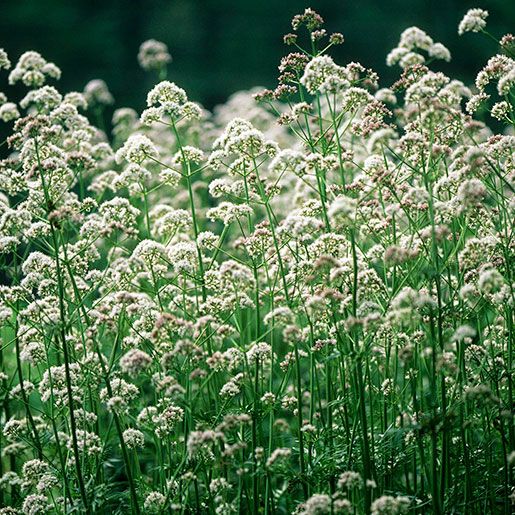Valerian (Valeriana officinalis): The Calming Herb for Restful Sleep and Relaxation
Valerian, scientifically known as Valeriana officinalis, is a perennial flowering plant native to Europe and Asia. It has a long history of traditional use as a natural remedy for promoting relaxation, easing anxiety, and improving sleep quality. Valerian is renowned for its unique aroma and potent medicinal properties, making it a popular choice for those seeking natural alternatives to support their mental and physical well-being. In this article, we will explore the fascinating world of valerian, including its botanical features, historical uses, chemical constituents, and potential health benefits.
Botanical Features:
Valerian is a herbaceous plant that grows up to one meter in height. It has a thick, fleshy root system and produces clusters of small, fragrant flowers with pink or white petals. The plant's leaves are feathery and arranged in pairs along the stem. Valerian prefers moist soil and is often found in meadows, woodlands, and along riverbanks.
Historical Uses:
Valerian has a rich history dating back to ancient times, where it was used for its calming and medicinal properties. It was commonly employed in traditional European and Asian herbal medicine systems. Valerian was revered for its ability to promote relaxation, relieve nervousness, and induce restful sleep. It was often recommended for individuals struggling with insomnia, anxiety, and stress-related disorders.
Chemical Constituents:
Valerian contains a variety of active compounds that contribute to its therapeutic effects. The plant's roots are particularly rich in volatile oils, including valerenic acid, valerenal, and valeranone. These compounds are believed to interact with certain neurotransmitters in the brain, such as gamma-aminobutyric acid (GABA), which plays a crucial role in regulating anxiety and promoting relaxation.
Potential Health Benefits:
1. Sleep Support: Valerian is widely recognized for its ability to support healthy sleep patterns. It may help reduce the time it takes to fall asleep, improve sleep quality, and enhance overall sleep duration. Valerian is commonly used as a natural remedy for individuals experiencing insomnia or difficulty in achieving restful sleep.
2. Anxiety and Stress Reduction: Valerian has a calming effect on the nervous system, making it a popular choice for alleviating symptoms of anxiety and stress. It may help reduce feelings of restlessness, nervousness, and tension, promoting a sense of relaxation and tranquility.
3. Relaxation and Muscle Relaxant: Valerian has mild muscle relaxant properties, which can help relieve muscle tension and promote a sense of physical relaxation. It may be beneficial for individuals experiencing muscle spasms, cramps, or general muscle discomfort.
4. Mood Enhancement: Valerian is believed to have mood-enhancing properties, possibly due to its interaction with neurotransmitters in the brain. It may help uplift mood, improve emotional well-being, and reduce symptoms of mild depression.
5. Menstrual Discomfort: Valerian has been traditionally used to alleviate symptoms associated with menstruation, such as menstrual cramps and mood swings. Its muscle relaxant properties may help ease uterine contractions and promote a more comfortable menstrual cycle.
Safety Considerations:
Valerian is generally considered safe for most people when used in recommended dosages. However, it is important to keep the following considerations in mind:
1. Sedative Effects: Valerian may cause drowsiness and sedation, particularly when taken in higher doses or combined with other sedative medications. It is advisable to avoid driving or operating heavy machinery after taking valerian.
2. Allergic Reactions: While rare, some individuals may experience allergic reactions to valerian. If you have known allergies to plants in the Asteraceae family, such as ragweed or chamomile, exercise caution when using valerian.
3. Drug Interactions: Valerian may interact with certain medications, including sedatives, anticonvulsants, and some antidepressants. Consult with your healthcare provider before using valerian if you are taking any medications.
Conclusion:
Valerian is a valuable herb known for its calming properties and potential health benefits. From promoting restful sleep and reducing anxiety to supporting relaxation and easing menstrual discomfort, valerian has been utilized for centuries as a natural remedy for various ailments. However, it is essential to use valerian responsibly, following recommended dosages and consulting with a healthcare professional if you have any concerns or medical conditions. By incorporating valerian into your wellness routine, you may find relief from stress, improved sleep quality, and a greater sense of relaxation and well-being.





0 Comments